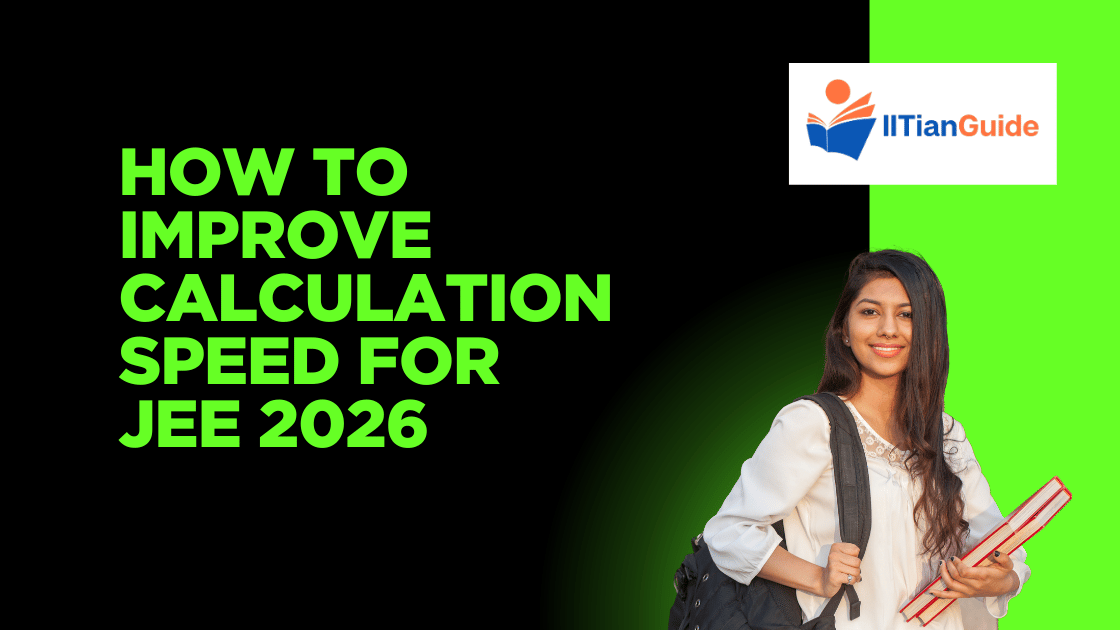How to Improve Calculation Speed for JEE 2026

The JEE Main and Advanced are among the toughest engineering entrance exams in India. Success in these exams depends not only on strong concepts but also on how fast you can solve questions with accuracy. With limited time and a large number of questions, to improve calculation speed for JEE 2026 is one of the most crucial skills for aspirants.
A student must balance speed with accuracy. Solving more problems correctly in the shortest time gives you a competitive advantage and helps in improving your rank. This blog explains proven strategies and techniques to improve calculation speed for JEE 2026 without compromising accuracy.
Why Speed is Essential in JEE 2026
The JEE Main exam consists of 90 questions to be solved in 3 hours. This means you get only about 2 minutes per question. Some problems are straightforward, but others can be tricky and time-consuming.
If you cannot maintain speed, you risk leaving questions unanswered, directly impacting your score and rank. Hence, every aspirant must focus on improving calculation speed for JEE 2026 while ensuring accuracy.
Best Practices to Improve Problem-Solving Speed
1. Strengthen Concepts First
Before you think about speed, ensure your fundamentals are crystal clear. A strong grasp of formulas, theorems, and concepts allows you to quickly identify patterns and apply the right methods. Confidence in basics automatically boosts your problem-solving speed.
2. Solve Previous Years’ Papers
Solving past JEE papers is one of the most effective ways to improve calculation speed for JEE 2026. These papers give you a clear idea of the question types, recurring concepts, and the overall difficulty level.
Try to solve at least one to two papers each week. Always time yourself while attempting them. After finishing, review your mistakes and identify where you spent extra time. This consistent practice will train your mind to work faster under exam conditions.
3. Attempt Mock Tests for Time Management
Mock tests simulate the real exam environment. They help you test your knowledge, speed, and stamina. Initially, you can practise without strict timing to understand the questions better. Gradually, move towards time-bound tests to develop exam temperament.
Attempt full-length 3-hour mock tests regularly. Analyse your performance after each test. Look for sections or question types where you spend extra time. This reflection will help you create a strategy to balance speed and accuracy.
Techniques to Improve Computational Skills
1. Learn Shortcuts and Tricks
Mastering shortcuts in Mathematics and Physics can save you precious minutes. For instance, memorising trigonometric identities, logarithmic properties, and Vedic maths tricks for quick multiplication or division can make a big difference. In Physics, estimation methods help you approximate values without long calculations.
2. Practise Speed Calculations Daily
To improve calculation speed for JEE 2026, dedicate daily time to mental arithmetic. Revise multiplication tables, squares, cubes, and common fractions. This will help you perform calculations faster without relying heavily on rough work.
Here’s a quick table of essential calculations every JEE aspirant must master:
|
Calculation Type |
Example |
Target Time |
|
Squares up to 30 |
27² = 729 |
2 seconds |
|
Cubes up to 20 |
18³ = 5832 |
3 seconds |
|
Fraction to percentage |
3/8 = 37.5% |
2 seconds |
|
Common ratios |
16:24 = 2:3 |
2 seconds |
3. Write Less, Think More
In the exam, avoid writing unnecessary steps. Train yourself to perform more calculations mentally. For algebra or simplification-based problems, try to jump directly to the final step. This habit will come with regular practice and will significantly reduce the time spent on each question.
4. Eliminate Unnecessary Steps
Don’t overcomplicate a problem. Break it into smaller, manageable parts and use logical elimination for multiple-choice questions. If you find a problem taking too long, mark it and move on. Coming back later often saves time instead of being stuck.
How Regular Practice Builds Speed
Speed cannot be built overnight. Daily practice is the key. Combine conceptual clarity, timed practice, and mental calculations in your routine. Regular exposure to question patterns helps you react quickly during the actual exam.
Remember, speed without accuracy is useless. Always balance both. A faster attempt with careless mistakes will bring down your score. Aim for smart, accurate, and consistent performance.
Conclusion
To improve calculation speed for JEE 2026, aspirants must focus on building strong fundamentals, practising past papers, and regularly attempting timed mock tests. Using mental maths, shortcuts, and logical elimination further saves time during the exam.
Speed with accuracy is the ultimate formula for success in JEE. With the right approach, dedication, and smart techniques, you can attempt more questions confidently and improve your chances of securing a top rank.
Frequently Asked Questions (FAQs)
Q1. Why is calculation speed important for JEE 2026?
Because the exam has strict time limits, fast and accurate calculations allow you to attempt more questions, improving your overall score and rank.
Q2. How can I practise speed calculations daily?
Dedicate 15–20 minutes to mental arithmetic like tables, squares, cubes, percentages, and ratios. This builds confidence and reduces dependency on rough work.
Q3. Do shortcuts really help in JEE?
Yes. Learning formulas, Vedic maths tricks, and elimination techniques saves time on lengthy problems. However, they should not replace conceptual understanding.
Q4. How many mock tests should I take before JEE 2026?
Aim to attempt at least 20–25 full-length mock tests. Analysing each test is as important as attempting it.
Q5. Can speed be improved without losing accuracy?
Yes. Regular practice, combined with conceptual clarity, helps you strike the right balance between speed and accuracy.

